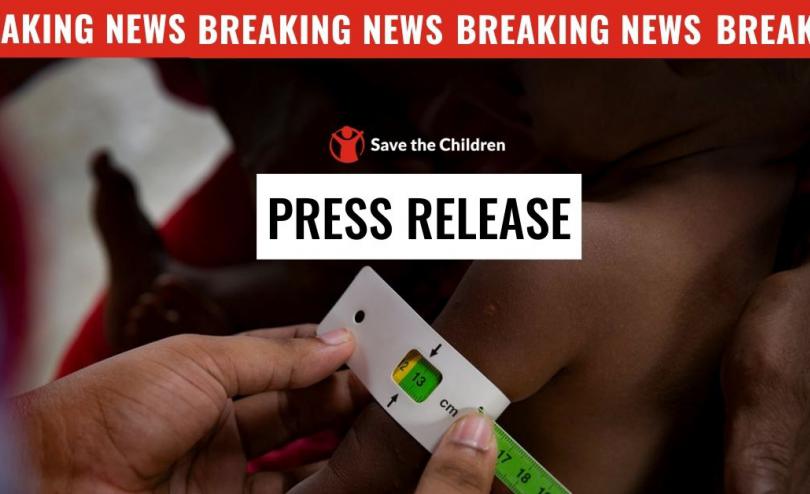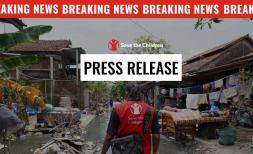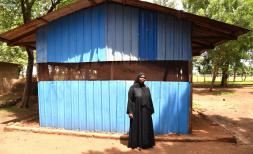Number of children lacking routine immunisations three times higher in conflict zones than the rest of the world

Audio clip of Hadia* available here
PARIS, 18 June 2024 – The number of children who have never had a routine vaccination – often referred to as “zero-dose” children – is three times higher in conflict zones (22.7%) than in the rest of the world (7.1%), Save the Children said today.
The child rights organisation also said that the number of “zero-dose” children in African countries is twice as high as the rest of the world (18.7% compared to 6.9%).
This new analysis of UN data comes ahead of a major global conference in Paris this week that will ask for ambitious funding for immunisations and launch a new initiative to boost vaccine manufacturing and production across Africa.
The analysis should serve as a rallying cry to donors to ramp up funding for Gavi, the global Vaccine Alliance, said Save the Children, particularly those who have committed to spending 0.7% of national budgets on overseas development assistance. Save the Children has a partnership with Gavi, to strengthen vaccination efforts and health services to reach zero-dose children in marginalised and hard-to-reach communities.
Every child has the right to vaccines as part of their right to health, Save the Children said. Children living in conflict zones are already at a huge health disadvantage, with displacement disrupting their access to services and contributing to spread of disease.
When the conflict broke out in Sudan last year, 30-year-old Hadia*i, a mother of five, was forced to flee from her home in Khartoum to River Nile state, having given birth to her youngest child just two days before.
Hadia* said: “I was scared about my children missing their immunisations, even more than the displacement itself.
“I know that missing immunisations can make children sick, they can get polio, measles, diphtheria, and other diseases that can impact their growth or even cause death.”
Save the Children said that with an ambitious increase in funding, Gavi will be able to invest in the strengthening of health systems and delivery of more vaccines for children, with a focus on children who are “zero-dose” and those who are under-immunised, as well as those in conflict zones or places at high risk to climate change impacts. Nearly half the countries eligible for Gavi’s funding are classified as fragile and conflict-affected states.
Inger Ashing, CEO of Save the Children International said:
"Every child has the right to survive, yet a shocking number are dying from preventable diseases because they lack access to immunisations. These are often children who have already lost so much through unbearable experiences of conflict and displacement.
"Not only is it possible to make sure that no child is left behind, it is critical. We need to see governments, the private sector and partners prioritise the lives and wellbeing of children and fully fund and support Gavi.
“We also welcome the launch of the African Vaccine Manufacturing Accelerator (AVMA), which will boost the capacity and autonomy of African countries to produce their own vaccines. This will open the doors for so many children across the continent to be protected against preventable diseases.”
ENDS
NOTES TO EDITORS
The conference in Paris on 20 June co-hosted by Gavi, the African Union and the Government of France will make the case for donors to invest in a new era of immunisation with the launch of Gavi’s investment opportunity for 2026-2030. It will also launch the African Vaccine Manufacturing Accelerator, which will provide financial incentives to help vaccine manufacturers in Africa scale up production and become sustainable on a long-term basis. The need to diversify vaccine manufacturing was a key learning from the COVID-19 pandemic, when a lack of local manufacturing capacity in Africa and other parts of the world meant these countries had to wait longer for vaccines to become available, leading to just 12% of the African population fully vaccinated against COVID-19 in April 2022.
Save the Children has a Memorandum of Understanding with Gavi, focused on advancing immunisation in conflict-affected areas and fragile states to reach zero-dose children.
Methodological note:
The analysis uses WHO/UNICEF estimates of national immunization coverage (latest available data for 2022), which is also available via Save the Children’s Child Atlas. We use estimates of coverage of children with the first dose of the diphtheria- tetanus-pertussis (DTP) vaccine to derive the share of children not receiving any DTP dose (“zero-dose”). We then compare the population-weighted coverage rates in Africa and the rest of the world, using population estimates from the UN Population Prospects. Similarly, we estimate coverage rates across 38 fragile- and conflict-affected countries (as categorised by the World Bank) compared to the 155 countries in the sample not affected.
[1] Save the Children supported Hadia* through providing routine immunisations, including polio, to her children.
For more information or interview requests please contact:
Emily Wight, Global Media Manager, Emily.Wight@savethechildren.org
Our media out of hours (BST) contact is media@savethechildren.org.uk / +44(0)7831 650409
Please also check our Twitter account @Save_GlobalNews for news alerts, quotes, statements, and location Vlogs.
Our media out of hours (BST) contact is media@savethechildren.org.uk / +44(0)7831 650409
Please also check our Twitter account @Save_GlobalNews for news alerts, quotes, statements, and location Vlogs.




